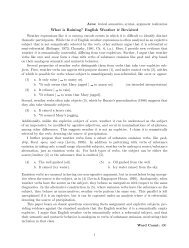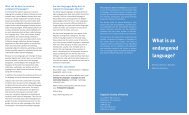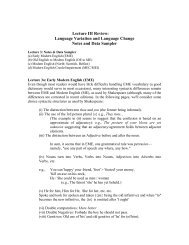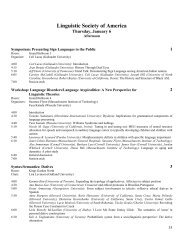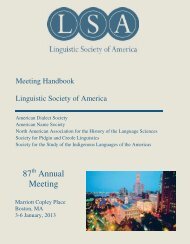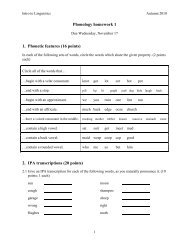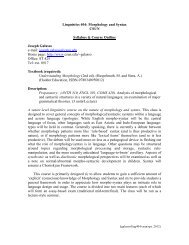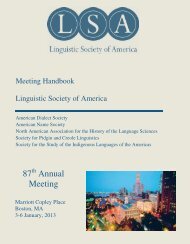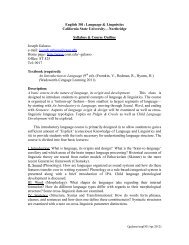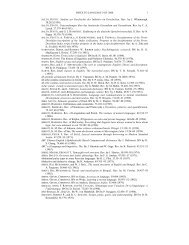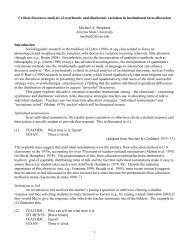Kathryn Flack (University <strong>of</strong> Massachusetts, Amherst) Session 18Phonotactic restrictions across prosodic domainsFor any phonotactic restriction on syllable onsets and codas, it can be shown that <strong>the</strong>re are corresponding restrictions on <strong>the</strong> edges <strong>of</strong>higher prosodic domains--words, phrases, utterances, etc. In order to account for <strong>the</strong>se correspondences among restrictions on <strong>the</strong>edges <strong>of</strong> prosodic domains, I argue that any markedness constraint referring to syllable onsets (M Onset ) or codas (M Coda ) is part <strong>of</strong> aM Onset (Onset/Y) or M Coda (Coda/Y) constraint schema. Through constraint interaction, <strong>the</strong>se prosodic domain-edge markednessconstraints can induce epen<strong>the</strong>sis, deletion, and meta<strong>the</strong>sis at <strong>the</strong> edges <strong>of</strong> prosodic domains and can also determine a word’s prosodicstructure.Nicholas Fleisher (University <strong>of</strong> California, Berkeley) Session 46Infinitival relative standards for attributive gradable adjectivesI examine <strong>the</strong> syntax and semantics <strong>of</strong> English attributive adjectives with postnominal infinitival clauses. I am particularly concernedwith those adjectives that do not select infinitival complements, like long, and with <strong>the</strong> ‘inappropriateness’ reading associated with<strong>the</strong>m in this construction, as in <strong>the</strong> sentence Middlemarch is a long book to read in one sitting. I propose that sentences <strong>of</strong> this typeare in fact comparatives, with <strong>the</strong> infinitival clause filling <strong>the</strong> role <strong>of</strong> <strong>the</strong> than-clause in an ordinary comparative. Theinappropriateness reading falls out from basic composition <strong>of</strong> <strong>the</strong> independently motivated semantics <strong>of</strong> comparatives and infinitivalrelatives.Simeon Floyd (University <strong>of</strong> Texas-Austin) Session 104On <strong>the</strong> status <strong>of</strong> <strong>the</strong> ‘adjectival noun’ in <strong>the</strong> Quechuan languagesThe Quechuan languages are frequently described as prototypical <strong>of</strong> systems that do not formally distinguish between adjectives andnouns. I show how a close look at syntactic head-modifier relationships and at issues <strong>of</strong> discourse context can reveal a subtle formaldistinction between a large class <strong>of</strong> nouns and a smaller class <strong>of</strong> true Quechua adjectives. I use examples from my video/elicitationmaterials <strong>of</strong> <strong>the</strong> Imbabura and Cotopaxi dialects <strong>of</strong> Ecuadorian Quechua and compare <strong>the</strong>m with examples from several Peruviandialects to find ways <strong>of</strong> rethinking <strong>the</strong> concept <strong>of</strong> ‘adjectival nouns’ in <strong>the</strong> Quechuan languages.Vivienne Fong (Stanford University) Session 37Verbs, sources, & goalsThe source prepositions from and out <strong>of</strong>/<strong>of</strong>f are different. In manner <strong>of</strong> motion constructions, from PPs tend to require a goal phrase;out <strong>of</strong>/<strong>of</strong>f tend not to. From PPs tend to require a goal phrase with atelic verbs, but not with telic verbs; out <strong>of</strong>/<strong>of</strong>f are neutral. Thesetendencies are unaccounted for in discussions <strong>of</strong> <strong>the</strong> Goal Path bias. I propose different semantics for from and out <strong>of</strong>/<strong>of</strong>f, and model<strong>the</strong> co-occurrence patterns <strong>of</strong> <strong>the</strong>se preposition and verb classes in optimality <strong>the</strong>ory. The resulting factorial typology reveals a set <strong>of</strong>universal implications that correctly predicts <strong>the</strong> asymmetries in verb-PP combinations.John Foreman (Utica College) Session 99Do children still speak Macuiltianguis Zapotec?I explore whe<strong>the</strong>r children still acquire Sierra Juárez Zapotec as spoken in San Pablo Macuiltianguis (SPM) in Oaxaca, Mexico. SomeZapotec villages are filled with Zapotec-speaking children, and in SPM itself, numerous Chinantec speakers attend <strong>the</strong> junior high.However, <strong>the</strong> youngest Zapotec speaker I had previously identified is 32. The 2000 census, though, found some 197 Zapotec speakers5-19 years old in SPM. I report <strong>the</strong> results <strong>of</strong> a qualitative study that investigated in what sense <strong>the</strong>se children are speakers. Do <strong>the</strong>yhave passive comprehension or are <strong>the</strong>y active speakers?Ca<strong>the</strong>rine Fortin (University <strong>of</strong> Michigan) Session 29Indonesian sluicingWhen sluicing is viewed cross-linguistically, certain morphosyntactic patterns are assumed to be without exception. These patternsinclude <strong>the</strong> P-stranding generalization (Merchant 2001) and <strong>the</strong> prohibition on voice alternations between antecedent clauses andsluices that contain 'sprouted' (Chung, Ladusaw, & McCloskey 1995) wh-expressions. In this, <strong>the</strong> first detailed examination <strong>of</strong>Indonesian sluicing, I show that Indonesian appears to conform to nei<strong>the</strong>r <strong>of</strong> <strong>the</strong>se two patterns, and I address <strong>the</strong> implications <strong>of</strong> thisnew data for 'movement-and-deletion' analyses <strong>of</strong> sluicing (e.g. Ross 1969) which maintain a semantic identity condition must obtainbetween <strong>the</strong> antecedent and sluiced clauses (e.g. Merchant 2001).121
Cynthia A. Fox (University at Albany, State University <strong>of</strong> New York) Session 64La pâtisserie de Bayeux: (Mis)adventures in transcribing a mega-corpus <strong>of</strong> Franco-<strong>America</strong>n FrenchWe report on <strong>the</strong> transcription phase <strong>of</strong> a project to collect and analyze a large-scale representative sample <strong>of</strong> <strong>the</strong> French spoken by <strong>the</strong>Franco-<strong>America</strong>n population <strong>of</strong> <strong>the</strong> nor<strong>the</strong>astern United States. We first describe <strong>the</strong> transcription protocol and <strong>the</strong> different measurestaken to train and ensure uniformity <strong>of</strong> practice among our research team. We <strong>the</strong>n provide examples <strong>of</strong> utterances that were initiallymisunderstood and <strong>of</strong> <strong>the</strong>ir subsequent reanalysis. We demonstrate how <strong>the</strong>se misperceptions, which frequently provided comic reliefduring an o<strong>the</strong>rwise arduous task, help us to better understand features that define Franco-<strong>America</strong>n as a distinct variety <strong>of</strong> North<strong>America</strong>n French.Itamar Francez (Stanford University) Session 37Semantic structure & argument realization in (mostly Hebrew) existentialsAcross languages, <strong>the</strong> single NP in existential constructions (<strong>the</strong> ‘pivot’) exhibits coding properties inconsistent with ei<strong>the</strong>r subject orobject classification. Previous analyses have related <strong>the</strong> morphosyntax <strong>of</strong> pivots to unaccusativity. I argue that unaccusativity cannotaccount for <strong>the</strong> properties <strong>of</strong> pivots and that <strong>the</strong>y are best analyzed as a semantically predicative element ra<strong>the</strong>r than a semanticargument. I propose a novel semantics for existentials in which <strong>the</strong> pivot is a predicate <strong>of</strong> contextually determined domains. I showhow <strong>the</strong> proposed semantics illuminates <strong>the</strong> o<strong>the</strong>rwise anomalous morphosyntax <strong>of</strong> Hebrew existentials, demonstrating thatmorphosyntactic generalizations are to a large extent semantically driven.Elaine J. Francis (Purdue University) Session 12Stephen Mat<strong>the</strong>ws (University <strong>of</strong> Hong Kong)Verb-doubling facilitates sentence production in CantoneseSeveral constructions in Chinese exhibit verb-doubling, whereby a copy <strong>of</strong> <strong>the</strong> main verb occurs both before and after <strong>the</strong> directobject. Our study examines cases where <strong>the</strong>re is a choice between constructions with and without verb-doubling in Cantonese. Incontrast to previous discourse-based accounts, we propose that grammatically nonobligatory verb-doubling occurs to facilitatesentence processing when <strong>the</strong> object is heavy, as predicted by Hawkins' 2004 principle <strong>of</strong> minimize domains. Our poster reports <strong>the</strong>results <strong>of</strong> an elicited production task using stimuli with light, medium, and heavy object NPs in configurations where verb-doubling ispossible but not present in <strong>the</strong> stimuli.Melissa Frazier (University <strong>of</strong> North Carolina, Chapel Hill) Session 50Dominance in inflectional paradigmsI examine <strong>the</strong> accent patterns <strong>of</strong> a<strong>the</strong>matic nouns in Proto-Indo-European, which are each distinguished by alternating stress or vowelquality between ‘weak’ and ‘strong’ forms. Surface stress is predictable given <strong>the</strong> accent specifications <strong>of</strong> <strong>the</strong> morphemes thatcompose <strong>the</strong> stem. The strong endings are dominant and responsible for <strong>the</strong> accent/ablaut alternations. In optimality <strong>the</strong>ory, <strong>the</strong> weakforms are accounted for with a ranking <strong>of</strong> faithfulness and alignment constraints. The dominant strong endings trigger antifaithfulnessconstraints (Alderete 1999), and so a new type <strong>of</strong> antifaithfulness constraint is introduced that works within inflectional paradigms,following <strong>the</strong> optimal paradigms model (McCarthy 2005).Shin Fukuda (University <strong>of</strong> California, San Diego) Session 25Control/raising ambiguity with aspectual verbs is a structural ambiguityAccording to most <strong>of</strong> <strong>the</strong> current analyses <strong>of</strong> control/raising, which assume that <strong>the</strong> control/raising distinction derives from selectionalrestrictions, control/raising ambiguity with aspectual verbs (Perlmutter 1970) would have to be a lexical ambiguity. I argue, instead,that it is a structural ambiguity. Following Wurmbrand's (2001) analysis <strong>of</strong> <strong>the</strong> control/raising ambiguity in German, I argue thataspectual verbs occupy two different positions in a clause, ei<strong>the</strong>r below or above voice/v, in three unrelated languages--Japanese,Basque, and Romance languages. My analysis is also extended to English aspectual verbs, whose positional differences arguablyresult in two different complement structures--infinitival and gerundive.N. Louanna Furbee (University <strong>of</strong> Missouri, Columbia) Session 98Tojolab'al reflexes <strong>of</strong> a Classic Maya rhetorical structure & its discourse markers (T 126/M-L 32M & T 679/M-L YM1)I report identification <strong>of</strong> (1) a discourse structure and (2) two particles in present-day Tojolab'al Maya narrative that reflect both arhetorical device and two marker glyphs in Maya hieroglyphic inscriptions. Both in hieroglyphic inscriptions and present-day122
- Page 1:
MEETING HANDBOOKLINGUISTIC SOCIETY
- Page 5 and 6:
Meeting RoomsSECOND FLOORFOURTH FLO
- Page 7:
• LSA: Business Meeting and Award
- Page 11 and 12:
LSAThursday, 4 JanuaryEveningWelcom
- Page 13 and 14:
Friday MorningLSAConstructions and
- Page 15 and 16:
LSAFriday, 5 JanuaryAfternoonInvite
- Page 17 and 18:
Friday AfternoonLSAModeling Acquisi
- Page 19 and 20:
LSARules for Motions and Resolution
- Page 24 and 25:
LSASaturday AfternoonSymposium: Par
- Page 26 and 27:
LSASaturday AfternoonSyntactic Face
- Page 28 and 29:
LSASunday MorningFirst Language Acq
- Page 30 and 31:
American Dialect SocietyThursday, 4
- Page 32 and 33:
ADSSaturday, 6 JanuaryMorningSessio
- Page 34 and 35:
American Name SocietyThursday, 4 Ja
- Page 36 and 37:
ANSFriday AfternoonForms of Address
- Page 38 and 39:
ANSSaturday AfternoonHistorical Ono
- Page 40 and 41:
Society for Pidgin and Creole Lingu
- Page 42 and 43:
SPCLSaturday, 6 JanuaryMorningSpeci
- Page 44 and 45:
Society for the Study of the Indige
- Page 46 and 47:
SSILAFriday AfternoonPhonology and
- Page 48 and 49:
SSILASunday, 7 JanuaryMorningSemant
- Page 50 and 51:
Part 1: Thursday, 4 JanuaryPart 2:
- Page 52 and 53:
Donca Steriade (Massachusetts Insti
- Page 54 and 55: Friday, 5 JanuaryPlenary AddressCal
- Page 56: Saturday, 6 JanuaryPresidential Add
- Page 59 and 60: Thursday, 4 JanuaryTutorialA Field
- Page 61 and 62: Thursday, 4 JanuarySymposiumContinu
- Page 63 and 64: Friday, 5 JanuarySymposiumApproache
- Page 65 and 66: Friday, 5 JanuaryDigital Poster Ses
- Page 67 and 68: Stephen R. Anderson (Yale Universit
- Page 69 and 70: David Bowie (University of Central
- Page 71 and 72: Sharon Peperkamp (CNRS/University o
- Page 73 and 74: Elena Guerzoni (University of South
- Page 75 and 76: Claire Bowern (Rice University)Morp
- Page 77 and 78: Lise Dobrin (University of Virginia
- Page 79 and 80: We discuss the analysis of the vowe
- Page 81 and 82: Brian Agbayani (California State Un
- Page 83 and 84: squiggly shapes). Disfluency made n
- Page 85 and 86: Adam Baker (University of Arizona)
- Page 87 and 88: final particle; this structure enco
- Page 89 and 90: Travis G. Bradley (University of Ca
- Page 91 and 92: demonstrated that 2-year-olds map n
- Page 93 and 94: Nancy J. Caplow (University of Cali
- Page 95 and 96: Sarah Churng (University of Washing
- Page 97 and 98: Jennifer Culbertson (Johns Hopkins
- Page 99 and 100: Scott Drellishak (University of Was
- Page 101 and 102: Marc Ettlinger (University of Calif
- Page 103: Scherre 2001 argue that the phenome
- Page 107 and 108: structures to the double object con
- Page 109 and 110: Steven Gross (East Tennessee State
- Page 111 and 112: Heidi Harley (University of Arizona
- Page 113 and 114: equivalents. I argue that their sim
- Page 115 and 116: predictable, and/or restricted in d
- Page 117 and 118: Keith Johnson (University of Arizon
- Page 119 and 120: Andrew Kehler (University of Califo
- Page 121 and 122: comparative rate of acquisition acr
- Page 123 and 124: Pei-Jung Kuo (University of Connect
- Page 125 and 126: EunHee Lee (University at Buffalo,
- Page 127 and 128: Brook Danielle Lillehaugen (Univers
- Page 129 and 130: Martha J. Macri (University of Cali
- Page 131 and 132: Spanish subjects with unaccusative
- Page 133 and 134: Brad Montgomery-Anderson (Universit
- Page 135 and 136: multi-ethnic configuration, and pos
- Page 137 and 138: Natalie Operstein (University of Ca
- Page 139 and 140: Nick Pharris (University of Michiga
- Page 141 and 142: Anastasia Riehl (Cornell University
- Page 143 and 144: Françoise Rose (CNRS-IRD) Session
- Page 145 and 146: precedence also constrains stative
- Page 147 and 148: use experimental and corpus techniq
- Page 149 and 150: eads easily for astrophysicists.).
- Page 151 and 152: domains of use are mostly complemen
- Page 153 and 154: show that both concatenative and no
- Page 155 and 156:
Don Walicek (University of Puerto R
- Page 157 and 158:
positions. However, certain matrix
- Page 159 and 160:
Suwon Yoon (University of Chicago)



